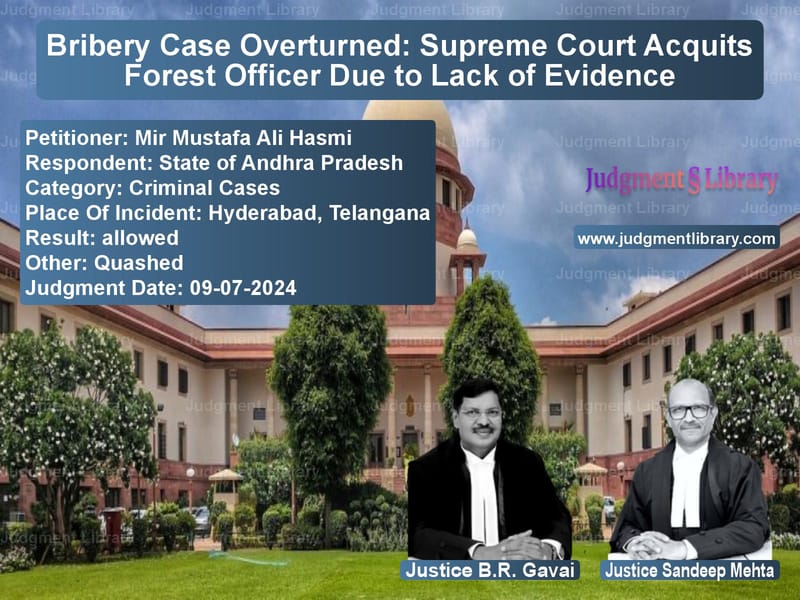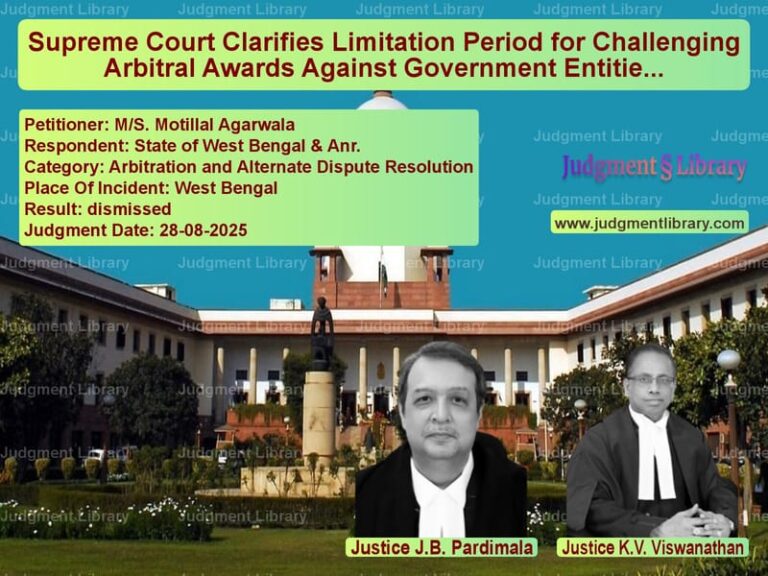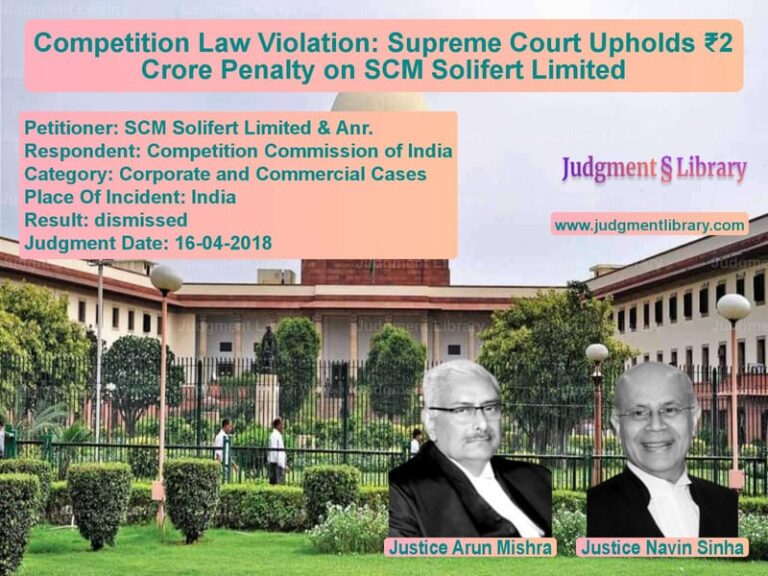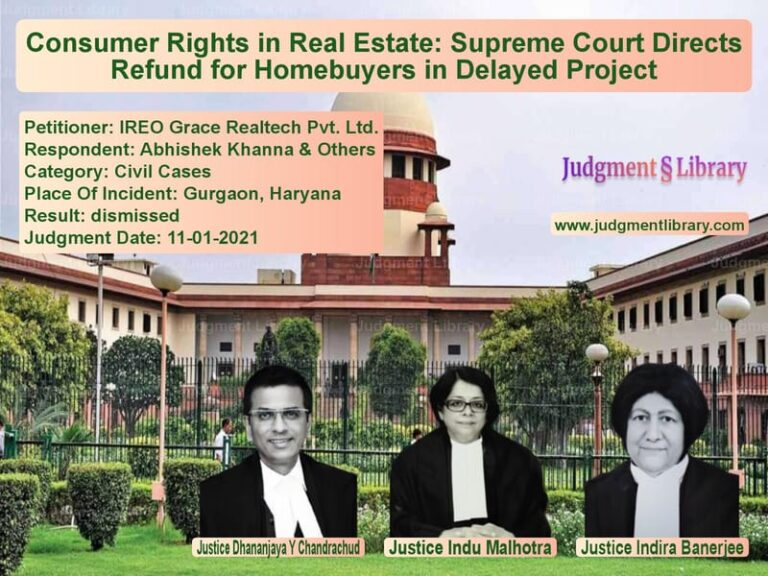Bribery Case Overturned: Supreme Court Acquits Forest Officer Due to Lack of Evidence
In a landmark judgment, the Supreme Court of India acquitted Mir Mustafa Ali Hasmi, a Forest Section Officer, in a bribery case due to insufficient evidence and procedural lapses by the prosecution. The ruling, delivered on July 10, 2024, overturned the decisions of the Telangana High Court and the trial court, which had convicted the appellant under the Prevention of Corruption Act, 1988.
Background of the Case
The case arose from a complaint filed by Mukka Ramesh (PW-1), who operated a sawmill in Vanasthalipuram, Hyderabad. On January 6, 2003, a Forest Flying Squad led by the appellant (AO1) and his subordinate, N. Hanumanthu (AO2), conducted an inspection at the sawmill. Allegedly, they found teakwood stored without a license and imposed a fine of Rs. 50,000 on an employee of the sawmill, M. Ashok, rather than on Ramesh.
The prosecution alleged that after this incident, the appellant and his co-accused began demanding a monthly bribe (mamool) of Rs. 5,000 from Ramesh under the threat of legal action. Unable to bear the pressure, Ramesh filed a complaint with the Anti-Corruption Bureau (ACB) on January 22, 2003, leading to a trap being set the next day.
Read also: https://judgmentlibrary.com/kidnapping-for-ransom-supreme-court-acquits-accused-after-21-years/
The Alleged Trap Operation
The trap was executed at Hotel Quality-Inn Residency in Nampally, Hyderabad, where the appellant had allegedly called Ramesh to hand over the bribe. According to the prosecution:
- Ramesh and his friend Potagunta Ramesh Naidu (PW-2) met the appellant in the hotel’s coffee shop.
- The appellant initially refused to accept the bribe in the coffee shop and asked them to follow him to the cellar.
- In the cellar, the appellant allegedly accepted the bribe and placed the cash in his rexine bag.
- As per protocol, Ramesh gave the pre-arranged signal, and the ACB team arrested the appellant.
- A phenolphthalein test confirmed traces of the chemical on the appellant’s hands.
Trial Court and High Court Convictions
On August 5, 2008, the trial court convicted the appellant under:
- Section 7 of the Prevention of Corruption Act (public servant taking gratification other than legal remuneration)
- Section 13(1)(d) read with 13(2) of the Act (criminal misconduct by a public servant)
He was sentenced to one year of rigorous imprisonment and fined Rs. 1,000 on each count.
The appellant’s co-accused, N. Hanumanthu, was acquitted by the High Court, which upheld the appellant’s conviction in 2022.
Supreme Court’s Observations
The Supreme Court, in its detailed judgment, found several flaws in the prosecution’s case.
1. Failure to Prove Demand for Bribe
The Court reiterated the principle laid down in Neeraj Dutta v. State (2023), which states that:
“Proof of demand and acceptance of illegal gratification by a public servant is a sine qua non in order to establish the guilt.”
The Court observed:
- No independent verification of the bribe demand was conducted before the trap was set.
- The prosecution failed to record any telephonic conversations between the appellant and the complainant.
- No attempt was made to fit the complainant with a recording device to capture the alleged demand.
2. Doubtful Circumstances Surrounding Acceptance of the Bribe
The Court noted that:
- The appellant’s rexine bag was left unattended at the coffee shop before he moved to the cellar.
- The complainant picked up the bag and handed it over to the appellant before the arrest.
- The prosecution failed to establish whether the appellant knowingly placed the tainted money in his bag.
3. Contradictions in Witness Testimonies
- PW-2 (Shadow Witness) was a close friend of the complainant, making him a biased witness.
- The ACB officials admitted they did not overhear the conversation where the bribe was allegedly demanded.
- Call records disproved the claim that the appellant had called the complainant before the trap.
4. Lack of Forensic Evidence
- No forensic report was submitted proving that the tainted notes were handled by the appellant.
- Although the phenolphthalein test was positive, the Court ruled that mere possession of tainted currency without proof of demand is not enough to convict.
Final Judgment
The Supreme Court ruled:
- The prosecution failed to prove the bribe demand beyond a reasonable doubt.
- The circumstances surrounding the acceptance of the bribe raised strong suspicion of entrapment.
- The conviction by the lower courts was based on assumptions and inconsistencies.
- The appellant was acquitted of all charges.
The Court also emphasized that public servants should not be falsely implicated, stating:
“Courts must be vigilant in ensuring that procedural lapses and weak evidence do not result in wrongful convictions.”
Key Takeaways
- Demand for Bribe Must Be Proven: Mere possession of tainted money is insufficient for conviction.
- Independent Witnesses Are Crucial: Courts should be wary of cases where the complainant’s close associates are used as sole witnesses.
- Procedural Lapses Can Lead to Acquittals: The failure to verify the demand and record conversations weakened the prosecution’s case.
- Entrapment Should Be Avoided: The Court cautioned against planting evidence to frame public officials.
Conclusion
The Supreme Court’s decision in this case reinforces the need for rigorous procedural compliance in corruption cases. By acquitting the appellant, the Court set an important precedent ensuring that convictions under the Prevention of Corruption Act are based on clear, convincing, and legally admissible evidence.
Petitioner Name: Mir Mustafa Ali Hasmi.Respondent Name: State of Andhra Pradesh.Judgment By: Justice B.R. Gavai, Justice Sandeep Mehta.Place Of Incident: Hyderabad, Telangana.Judgment Date: 09-07-2024.
Don’t miss out on the full details! Download the complete judgment in PDF format below and gain valuable insights instantly!
Download Judgment: mir-mustafa-ali-hasm-vs-state-of-andhra-prad-supreme-court-of-india-judgment-dated-09-07-2024.pdf
Directly Download Judgment: Directly download this Judgment
See all petitions in Fraud and Forgery
See all petitions in Money Laundering Cases
See all petitions in Judgment by B R Gavai
See all petitions in Judgment by Sandeep Mehta
See all petitions in allowed
See all petitions in Quashed
See all petitions in supreme court of India judgments July 2024
See all petitions in 2024 judgments
See all posts in Criminal Cases Category
See all allowed petitions in Criminal Cases Category
See all Dismissed petitions in Criminal Cases Category
See all partially allowed petitions in Criminal Cases Category







